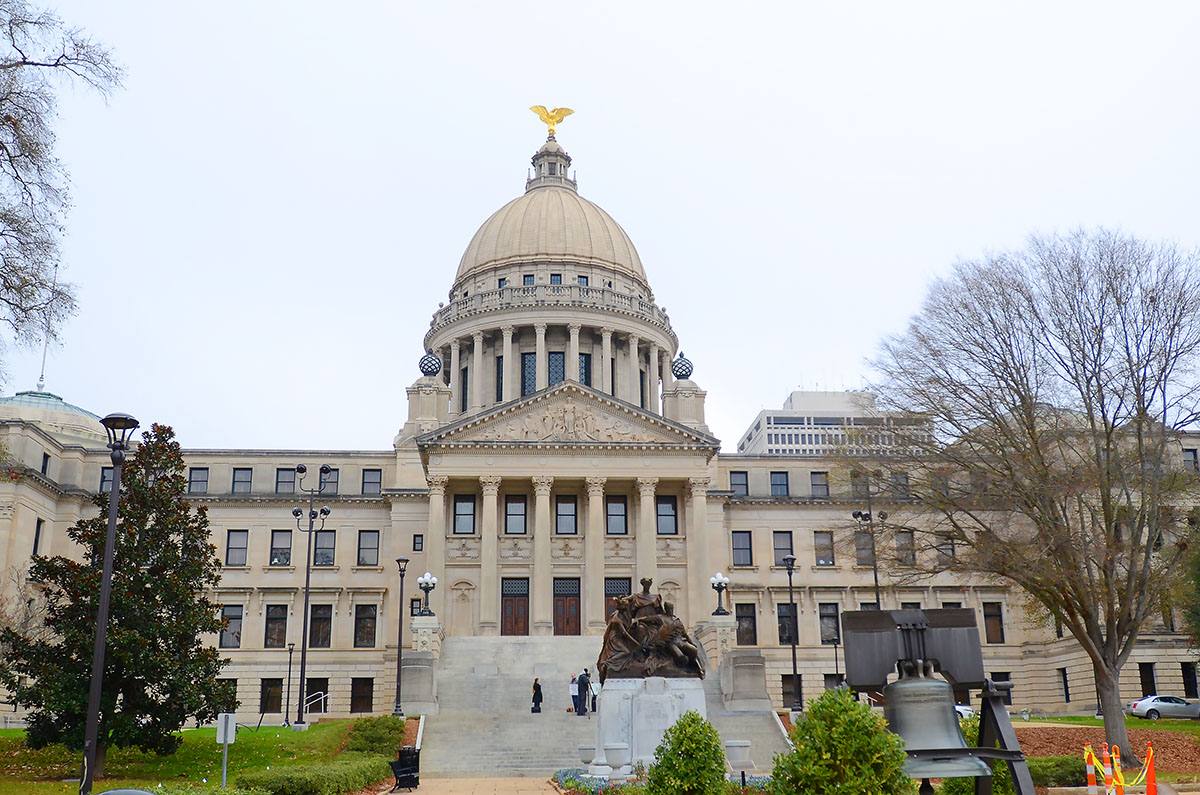Mississippi News
Lawmakers spend unprecedented state, federal funds

Lawmakers near finish line on spending unprecedented state and federal funds
Legislators worked late Monday night to fund state government at an unprecedented level and also to spend the bulk of $1.8 billion in federal pandemic stimulus provided to Mississippi by Congress.
The overall state support budget that has been agreed to by legislative leaders and is being rubberstamped by the full membership is expected to be $7.32 billion, or 9.2% more than what was appropriated for the current fiscal year.
Work continued late Monday to finalize the budget for the new fiscal year than begins July 1 and to spend the federal American Rescue Plan Act money. Legislators have a midnight Tuesday deadline to complete the process.
The bulk of the state’s federal ARPA money — $750 million — will go to cities, counties and rural water associations as matching money or grants for water and sewer infrastructure projects.
Note: Scroll to the bottom of this story to see a full list of the ARPA spending.
Because of an April 5 deadline and because legislators are limited in their impact over the budgeting process, most of the about 100 budget bills presented by the leadership were being approved Monday with little or no debate.
“This is frustrating on two levels: not enough members have input and if the conferencing (negotiations) was done in the open, then members would at least have more of an idea,” said Rep. Robert Johnson, D-Natchez, the House minority leader.
“And we are almost forced to take a vote because so much is done at deadline.”
Because of the infusion of an estimated $35 billion in federal coronavirus-relief funds into the state economy, state tax collections have soared, placing legislators in the rare position of being able to address more state needs than they are able to do during most sessions.
The state-support budget is funded from general tax revenue, such as the tax on retail items, income and other items. It does not include what are known as special fund agencies that are funded through a special tax or fee and it does not include federal funds, which provide state government an extra $11 billion.
Referring to the state support budget, Senate Appropriations Chair Briggs Hopson, R-Vicksburg, said, “To keep government services at the level we expect them to be we have to spend a little extra money to keep up with inflationary costs. I think we have done that in a responsible way in this budget.”
Hopson said the budget for most state agencies grew by an average of 3.1%. But the budget, which was still being finalized late Monday also will include other significant spending — sometimes one-time spending. For instance, the Legislature is budgeting $54 million to the Department of Human Services for a new computer system designed to help the agency that oversees various federal social services to operate more efficiently.
Public education formula will be shorted again
One entity that it appears will not keep up with inflation is the appropriation for the Mississippi Adequate Education Program, which provides the state’s share of the basics to operate local school districts.
MAEP’s funding is expected to increase $83.2 million, or 3.7%. But about $45 million of that additional spending will go for a teacher pay raise approved during the 2021 session, meaning those funds will not be available to help with the more than 6% increase in inflationary costs.
Senate Education Chair Dennis DeBar, R-Leakesville, said MAEP will be about $304 million short of full funding.
The budget also will include $246 million for the teacher pay raise approved this year by the Legislature. Those funds for the latest pay raise will not be incorporated into the MAEP funding formula until next year.
In addition, it appears that both the community colleges and public universities will receive sizable increases that can be used to provide faculty pay raises. The budget for the 15 community colleges is expected to increase almost 11% or $27.4 million, while the budget for the eight public universities is slated to jump by $125.7 million or 17%.
The budget also includes funds to pay for the increased costs to employees in the state health insurance program.
Hopson said the budget will also ensure no state employee “is going to be paid below the minimum as set by the state Personnel Board.”
The minimum is established by the Personnel Board by determining the salary for similar positions in the private sector and in surrounding states. Employees can go to the state Personnel Board web site to see what the salary range is for their job.
How federal ARPA money will be spent
Lawmakers agreed on spending $1.5 billion of the $1.8 billion the Legislature received, holding back more than $295 million that can be spent next year.
The largest expense — $750 million — will be providing matching money for city and county governments and rural water associations to help the states aging water and sewerage infrastructure. Cities and counties are receiving a combined separate $900 million in ARPA funds. The state will provide a 1-to-1 match to most cities and rural water associations, and a 2-to-1 match for small towns that are receiving less than $1 million from ARPA. The cap on the state ARPA match for cities will be $50 million.
The money would be provided as grants of up to $2.5 million for rural water associations.
Lt. Gov. Delbert Hosemann had initially pushed to spend much more on matching funds for major water, sewer and other projects for cities and counties. Hosemann had originally proposed the state spend up to half of its $1.8 billion ARPA allotment to match state funds to allow for larger, “transformational and generational” projects for local governments.
But legislative leaders and the head of the association representing Mississippi cities said they were pleased with the final ARPA spending agreement.
“We are disappointed it’s not as much as initially discussed — the needs are there — but we think it’s good they’ve come to this agreement,” said Mississippi Municipal League Director Shari Veazey. “There was talk at one point about them waiting for a year. Our cities have shovel-ready projects.”
Representatives of rural water associations — which provide water to most Mississippians — had told lawmakers they have about $1.4 billion in badly needed projects statewide. Many of these systems were built in the 1960s and 70s when affordable USDA loans were available, but they have not been able to afford maintenance and upgrades.
Sen. John Polk, R-Hattiesburg, led hearings over the summer and helped craft the Senate’s ARPA spending plan — much of which was agreed to by the House.
“I’m very pleased,” Polk said Monday evening about final ARPA agreements. “We are fixing to spend a lot of money that badly needs to be spent on very worthwhile projects across the state of Mississippi.”
House Speaker Pro Tem Jason White, R-West, said he was also pleased with the ARPA spending agreements. He said lawmakers can monitor the water and sewerage match programs, and potentially shift money or add more to it next year.
Although there was very little debate on any ARPA or budget bills as both the House and Senate passed bill after bill in a marathon Monday, some ARPA spending did generate questions. The decision for the state to provide $20 million in ARPA funds to private colleges and K-12 schools drew questions, and although it passed, it had some bipartisan opposition. The measure passed 64-27, with 16 not voting and 13 voting present.
“When you’re saying ‘independent colleges,’ that would be private colleges?” asked Rep. Becky Currie, who voted against the measure.
Rep. William “Bo” Brown, D-Jackson, said: “It seems to me we should be putting this money into our public schools, not private ones.”
In summer hearings, private college representatives said many of their campus buildings are around 100 years old and need work, and like public universities they could expand their nursing and other healthcare programs to help the state’s shortage.
ARPA spending list
Here is how lawmakers agreed to spend $1.5 billion of the more than $1.8 billion in ARPA funds allocated to the Legislature:
Environmental Quality/local water and sewerage: $450 million to match city and county ARPA money for water and sewerage infrastructure projects.
Child Protection Services: $59.1 million, the bulk of which will help the state’s troubled foster care system meet federal court-ordered reforms from a long-running federal lawsuit.
Employment Security: $60 million. This includes $40 million for nurse training at colleges and universities $20 million for health sciences infrastructure.
Emergency Management: $3.2 million to defray COVID-19 expenses.
Department of Finance and Administration: $337.25 million. This includes infrastructure upgrades at state agencies, colleges and universities and state parks. It also includes:
- $30 million: to tourism destination marketing organizations statewide
- $5 million: Small museums loan program
- $5 million: Mainstreet Program
- $10 million: to private colleges and universities
- $10 million: grants private K-12 schools
- $60 million: to defray increases in state employee health insurance costs
Health Department/rural water associations: $339.5 million, including $300 million for fiscal 2022 and $39.5 million for FY’23. The bulk of this, $300 million, will go to rural water associations statewide for infrastructure upgrades. Other money will go to Health Department operations, reimbursing hospitals for ICU and specialized beds during the pandemic and telehealth and other programs.
Public Universities/UMMC: $56 million. This includes $6 million for a nurse loan repayment and $50 million for University of Mississippi Medical Center renovations.
Mental Health: $104.6 million. The bulk of this money will be used to meet federal court-ordered reforms. Community mental health centers will receive $18.5 million.
Public Safety: $32.5 million over FY’22 and FY’23. This includes $12 million for premium pay for law enforcement and firefighters and $5 million for death benefits for first responders who died from COVID-19.
Supreme Court: $3.5 million. This includes money for DAs and staff, public defenders and trial judges to help reduce court backlogs.
University of Mississippi Medical Center School of Nursing building: $55 million.
Mississippi National Guard: $10.4 million for base infrastructure and improvements.
This article first appeared on Mississippi Today and is republished here under a Creative Commons license.
Mississippi News
Events happening this weekend in Mississippi: April 18-20

SUMMARY: This weekend (April 18-20), Mississippi offers a variety of events for all ages. In Jackson, enjoy Food Truck Friday, a jazz concert, free outdoor movie screenings, and multiple exhibitions including “Of Salt and Spirit” and “Hurricane Katrina: Mississippi Remembers.” For family fun, there’s an Easter Egg Hunt at the Ag Museum and “Bunnies & Butterflies” at MCM. Natchez features the Spring Pilgrimage, Lafayette’s 200th anniversary celebration, and a farmers market. In the Pine Belt, highlights include Live at Five, a Spring Candle-Making Workshop, and Easter events at the Hattiesburg Zoo. Don’t miss the Bluff City Block Party and more!
The post Events happening this weekend in Mississippi: April 18-20 appeared first on www.wjtv.com
Mississippi News
Events happening this weekend in Mississippi: April 11-13

SUMMARY: This weekend in Mississippi (April 11-13), enjoy a variety of events across the state. Highlights include the Eudora Welty Birthday Bash in Jackson, Trivia Night at the Mississippi Museum of Natural Science, and Boots & Bling Fundraiser in Natchez. For family fun, check out the Bunny Bonanza in Jackson or the Easter Egg Hunt in Clinton. The Natchez Concours d’Elegance Car Show and Stranger Than Fiction Film Festival offer cultural experiences, while the 12th Annual Dragon Boat Regatta in Ridgeland and the Hub City Classic Car Show in Hattiesburg provide exciting activities for all ages.
The post Events happening this weekend in Mississippi: April 11-13 appeared first on www.wjtv.com
Mississippi News
Ole Miss women get pair of double-doubles and roll to 83-65 March Madness win over Ball State

SUMMARY: Mississippi coach Yolett McPhee-McCuin found solace in returning to a different arena in Waco, Texas, following a disappointing previous tournament experience. The No. 5 seed Ole Miss Rebels redeemed themselves with an 83-65 victory over 12th-seeded Ball State in the NCAA Tournament’s first round. Starr Jacobs led the Rebels with 18 points and 11 rebounds, while Kennedy Todd-Williams and Madison Scott each scored 15 points. Ole Miss dominated rebounding, leading 52-32, and will face fourth-seeded Baylor next. Coach McPhee-McCuin noted the team’s evolution since their last visit and the significance of playing in Texas, where Jacobs feels at home.
The post Ole Miss women get pair of double-doubles and roll to 83-65 March Madness win over Ball State appeared first on www.wjtv.com
-

 News from the South - Alabama News Feed6 days ago
News from the South - Alabama News Feed6 days agoFoley man wins Race to the Finish as Kyle Larson gets first win of 2025 Xfinity Series at Bristol
-

 News from the South - Alabama News Feed7 days ago
News from the South - Alabama News Feed7 days agoFederal appeals court upholds ruling against Alabama panhandling laws
-

 News from the South - North Carolina News Feed5 days ago
News from the South - North Carolina News Feed5 days agoFDA warns about fake Ozempic, how to spot it
-

 News from the South - Missouri News Feed5 days ago
News from the South - Missouri News Feed5 days agoAbandoned property causing issues in Pine Lawn, neighbor demands action
-

 News from the South - Missouri News Feed3 days ago
News from the South - Missouri News Feed3 days agoDrivers brace for upcoming I-70 construction, slowdowns
-

 News from the South - Virginia News Feed5 days ago
News from the South - Virginia News Feed5 days agoLieutenant governor race heats up with early fundraising surge | Virginia
-

 News from the South - Oklahoma News Feed4 days ago
News from the South - Oklahoma News Feed4 days agoThursday April 17, 2025 TIMELINE: Severe storms Friday
-

 Mississippi Today4 days ago
Mississippi Today4 days agoSee how much your Mississippi school district stands to lose in Trump’s federal funding freeze



















































